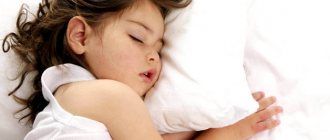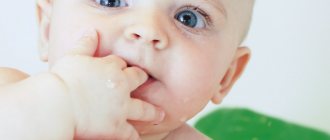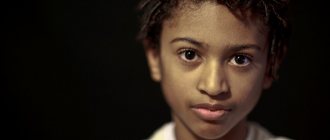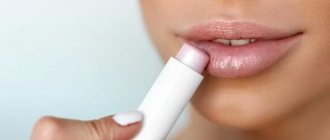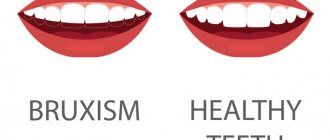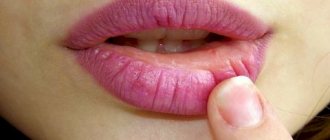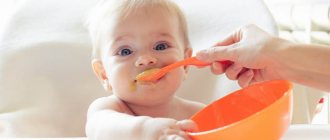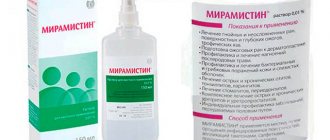Why does a child chew his lips?
It is worth noting that there are a decent number of reasons for the appearance of such a bad habit:
- Lack of vitamins and minerals in the body
- A feeling of negative emotions that a person tries to eliminate by biting his lips and cheeks
- Chapping of lips and appearance of crusts on them
- Nervous system diseases
As practice shows, even people who do not suffer from diseases of the nervous system and have a fairly balanced character often encounter the habit of lip biting. This is due to the fact that in the wind the lips can become very chapped and crusts will appear on them. At the same time, you want to rip off and rip off the rough skin in every possible way, which is rough and gets in the way.
Over time, actions that were repeated several times today turn into a bad habit. Now a person is trying in every possible way to tear off the skin, even if it is not rough, and the lips are not chapped. In this case, getting rid of the habit is simply enough with constant self-control and distraction.
Stress
What not to do
Lip biting should not continue during treatment and parents should monitor this. Although, the child is unlikely to do this, because without anesthesia it is quite painful. But you still need to spend as much time as possible with your baby. You should also not do the following:
- tear off the crust;
- treat with iodine (it can burn the delicate skin of the lips)
- apply local medications that were not prescribed by the doctor (the child may simply be poisoned);
- apply powdered antibiotics to the wound;
- Allow the child to touch the lip with his hands, tongue and teeth.
If no action is taken, there is a risk that the child will develop complications. Most often this happens when the wound becomes infected. In very young children or in children with weak immunity, a bitten lip can develop into stomatitis with the formation of multiple ulcers throughout the oral mucosa.
A child bites his lips and cheeks: psychosomatics
As for the psychological reasons for the emergence of this bad habit, everything is much more complicated. According to psychologists, the reason lies in childhood. The fact is that very often children suffer from this habit, starting from the age of 4 years. That is, this is a completely conscious age when the child speaks and is fully aware of what he is doing. Why does a habit arise in childhood that can accompany a person throughout his life?
Features of habit development:
- These are problems in communicating with parents. Quite often, people who grew up in a not very loving family, in which there are constantly quarrels, scandals, and misunderstandings, suffer from this bad habit. In such a family, the child is usually not allowed to express his opinion, believing that the adult is always right. That is, the child feels like an inferior member of the family and cannot express his emotions.
- The child is forbidden to scream, cry, and even express any complaints , considering the child to be a follower, he must obey his parents. Thus, the child does not want to be put in a corner, shouted at, and punished. He tries to express his emotions and opinions not through words and aggression, because it is prohibited, but through self-injury. That is, in this way, the child tries to bring himself to his senses and restrain aggression directed at his parents.
- From time to time this manipulation is repeated. Biting the inside of the lips and cheeks gives the child some comfort and also brings him to his senses. For example, a person is very angry, he has severe emotional pain, and he tries to drown it out with physical pain. Thus, he bites his cheeks and lips. Indeed, this is mainly due to psychological reasons that need to be dealt with.
The child is nervous
The baby screams, makes trouble, offends others
If the baby regularly makes scandals, this may indicate that the baby is hiding some serious problem. A little person in constant stress must throw out negative emotions, and he does this in the best way he knows how: he throws toys, hits and bites his mother, takes away the car from the neighbor boy. This behavior is often typical for children raised by one parent or grandparents.
The most amazing thing is that aggressive children can hear encouraging words from adults: “You are my best child,” “I adore you,” “You are my only hope in life.” The baby feels a serious burden of responsibility, because his parents consider him ideal, so he needs to live up to it. The nervous tension that grows inside every day does not give the child peace, and he has to use aggression to free himself from negative emotions.
A child bites his lips - what to do?
If you are the parent of such a baby, you need to look at in what cases the child bites his lips. That is, if he quarrels with someone, this is a way to calm down or control his anger.
Adviсe:
- Invite your child not to scream, but to express his opinion and negative emotions in ordinary words. The child must be able to talk and express his problems. In addition, you need to try to replace this habit with some other one. In a situation where the child bites his lips, you need to switch his attention to something else. That is, keep him busy with something.
- You can offer him a lollipop or chewing gum. Of course, this is replacing one habit with another, but it’s a pretty good, safer way to get rid of a habit. Some psychologists advise spending more time actively, accumulating positive emotions. It is necessary to come up with some new hobby for the child. You can take it to some sports section, or if it’s a girl, then beadwork, modeling from plasticine or polymer clay will not be amiss. This way, the child will be able to calm down and control his emotions without biting his lips, but by manipulating clay or some other handicraft.
- Some experts recommend giving children sedatives. However, in fact, they only slow down the functioning of the nervous system, but do not allow one to get rid of nervous tics. Thus, sedatives will reduce the number of stressful situations and reduce their occurrence, but will not solve the problem. It is necessary to delve into the child’s head and find the reason for this habit. After that, try to eliminate it and let it be solved in other ways.
Chews lips
Treatment options
What to do if a child bites his lip after anesthesia? First we need to assess the scale of the problem. If there is no hematoma or bleeding, and the sponge is only slightly swollen, then soon everything will go away on its own. Perhaps everything will be fine in the morning.
If a child has bitten the skin to the point of wounding, it needs to be treated. Because a sore lip will interfere with speaking normally and leading an active childhood life with outdoor games and putting anything in your mouth. How to treat?
Cold
Cold will help reduce bleeding, eliminate pain and reduce swelling. To do this, you can take ice or a piece of frozen semi-finished product from the freezer, wrap it in a clean soft cloth (a handkerchief, for example) and apply it to your lip for 1-2 minutes. You should not hold it for a long time to avoid tissue necrosis.
Analgesics
They can be used if the child is in great pain and does not allow any medical manipulation to be performed on the lip. Any children's painkillers are suitable: ibuprofen, nimesulide and other analgesics approved for a specific age.
Local antiseptics
Iodine and brilliant green are gradually becoming a thing of the past, and it is definitely not recommended to use them for damaged mucous membranes. It is best to take Miramistin. Its advantages for use with a bitten lip are obvious:
- does not stain the skin;
- does not sting;
- will not cause harm if part of the product gets into the mouth;
- tasteless.
Miramistin is a liquid solution. You can apply it through a spray bottle, which is included with the purchase of the antiseptic. Or you can soak a cotton swab in it and apply it to the child’s bitten lip.
Miramistin has only one drawback: it is quite expensive. A 150 ml bottle costs from 300 rubles. Its analogue is Chlorhexidine: it can also be used to treat a baby’s damaged lip.
Anti-inflammatory ointments
After treatment with an antiseptic, the wound on the bitten lip must be lubricated. And not all medications can be used, because a child can easily lick off the applied ointment or gel. This means that the product must be safe to swallow. The doctor should select it in accordance with the age of the small patient.
Important! You should also consult a doctor if there is heavy bleeding, severe pain, or the wound does not heal for a long time.
A child bites his lips and cheeks: consequences
Why is it harmful to bite your lips? The fact is that very often this leads to stomatitis, herpes, and inflammation. Sores in the mouth are excellent entry points for infection. And in the case of children, the situation gets worse, because kids love to put their fingers in their mouths, even preschool children who are about 5-6 years old.
Yes, they really wash their hands in kindergarten, but at the same time, if the child is in contact with other children, they constantly exchange toys and other objects with them, and accordingly some opportunistic microorganisms can accumulate on their hands. With weakened immunity, staphylococcus, as well as streptococcus, which is on the hands of every child, can penetrate into the wound and cause serious inflammation.
Very often, such children suffer from stomatitis and streptoderma. Thus, wounds can be observed in the mouth and lips, which very often provoke the occurrence of high temperature. Thus, the problem becomes not psychological, but physiological.
Thought about it
This is not the norm
But it is absolutely not the norm if a child sucks his lower lip at the age of 1 year. In this case, such behavior may signal problems:
- Feeling of discomfort. Perhaps the child has something hurting, for example a tooth, or stomatitis has formed under the lip.
- Overexertion and severe stress. This manner of behavior is typical of irritable and unbalanced people who, through this habit, also try to calm themselves down.
- The most dangerous situation is when the child simultaneously licks his lips and freezes, tenses, rolls his eyes, and makes monotonous intermittent movements of his limbs. This may be due to neurological diseases.
Of course, it is worth observing the frequency of such behavior. If a child licks his lip once or does it after every meal, then this should not be taken into account. But you need to be wary if he does this constantly or affects the lip so actively that swelling or blood stains appear on it.
A child chews his lips: should I punish him or not?
On many resources you can find advice on constantly monitoring and punishing your child. However, this doesn't actually produce any results. This further aggravates the psychological reasons and the child becomes confused and unable to control his emotions.
Adviсe:
- Under no circumstances should you scold, reprimand, or punish a child for biting his lips and cheeks. It is necessary to deal with the psychological cause and try to eliminate it. You need to come up with some alternative. You can give your child some kind of toy.
- Very often they recommend an interesting, unusual method. The bracelet is hung on the child’s wrist in the form of an elastic band. As soon as the child starts to get nervous, you need to snap this rubber band. The fact is that this is not done with the aim of punishing, but to draw the child’s attention to what he is doing.
- Indeed, very often, if a habit has become permanent and obsessive, it is performed with the help of the subconscious. The child is not aware of what he is doing. The rubber band on the wrist makes it clear that this is not necessary. Thus, it forces him and allows him to eliminate the desire to bite his lips.
- Of course, it is quite difficult to cope with such a problem on your own, so you can seek help from a psychologist. They mainly offer group lessons or private lessons.
- At the same time, the psychologist initially tries to understand the causes of this bad habit and correct the child’s behavior. Very often, childhood habits do not go away; they carry on into adulthood.
- A child, as a teenager and even an adult, continues to bite his lips and cheeks, but in order to calm down. That is, this is one of the ways to relieve nervous tension and relax. Basically, sessions with a psychologist involve saturating your life with some positive emotions.
- Even for adults, psychologists recommend inventing a hobby and spending a decent amount of time on it. Thus, a person saturates his life with positive emotions with the goal that there are fewer reasons to be nervous and bite his lips.
Obsessive movement syndrome
How to stop a child from biting his lips?
Adviсe:
- Many psychologists believe that the habit of biting lips and cheeks begins in childhood and is a lack of love for the baby. Parents devote very little time and attention to their child. Perhaps he lacks tactility. Hug him more often, kiss him, tell him how much you love him.
- You can just lie together before falling asleep, hugging each other. The child feels this love. Perhaps this will somehow normalize his emotional state. Quite often this appears in children after stopping breastfeeding.
- The fact is that when a child breastfeeds for a long time, for example up to 2-3 years, he gets used to it. For him, the breast serves not only as food, but also as comfort. When breastfeeding is stopped, the child has to reassure himself in some other way.
- Very often it is the lips and cheeks that come to the rescue. If this is due to stopping breastfeeding, try to switch the child's attention to something else. Perform the same ritual before bed so that the child falls asleep with you and does not bite his lips and cheeks.
- That is, you can tell him a fairy tale or sculpt something together. At the same time, try to encourage the baby in every possible way and ask him to come up with the ending of the fairy tale. When the child speaks, he will not be able to bite his lips and cheeks.
Stomatitis
A child bites his lips and cheeks most often due to emotional instability. Help him calm down and find the cause of the problem.
Causes
The causes of traumatic stomatitis may be the following:
- In children, this phenomenon is most often associated with active games and damage to the tooth or soft tissue as a result of a blow (for example, with a ball) or an unsuccessful landing on a hard object. However, this disease can also occur in infants as a result of injury to the gums by a protruding tooth.
- In the everyday life of an adult, the main cause of the onset of stomatitis can be a simple burn from hot tea. And if a person consumes very hot food and drinks systematically, such a burn and, accordingly, stomatitis, become chronic. By the way, you can get burned not only by hot food, but also by chemicals and medications used not according to instructions, acids, alkalis, and even electric shock and fire. In addition to a burn, stomatitis can also be caused by frostbite.
- Constant friction against the sharp edge of a chipped or broken tooth, poorly ground metal of braces, or poorly fitting dentures can also cause traumatic stomatitis. It is for this reason that you should not endure discomfort and pain due to the problems described above. The only correct solution would be to contact a dentist to eliminate the interference.
Another reason for the occurrence of this disease is bad habits, as a result of which the mucous membrane is injured:
